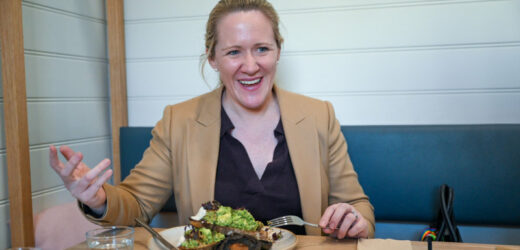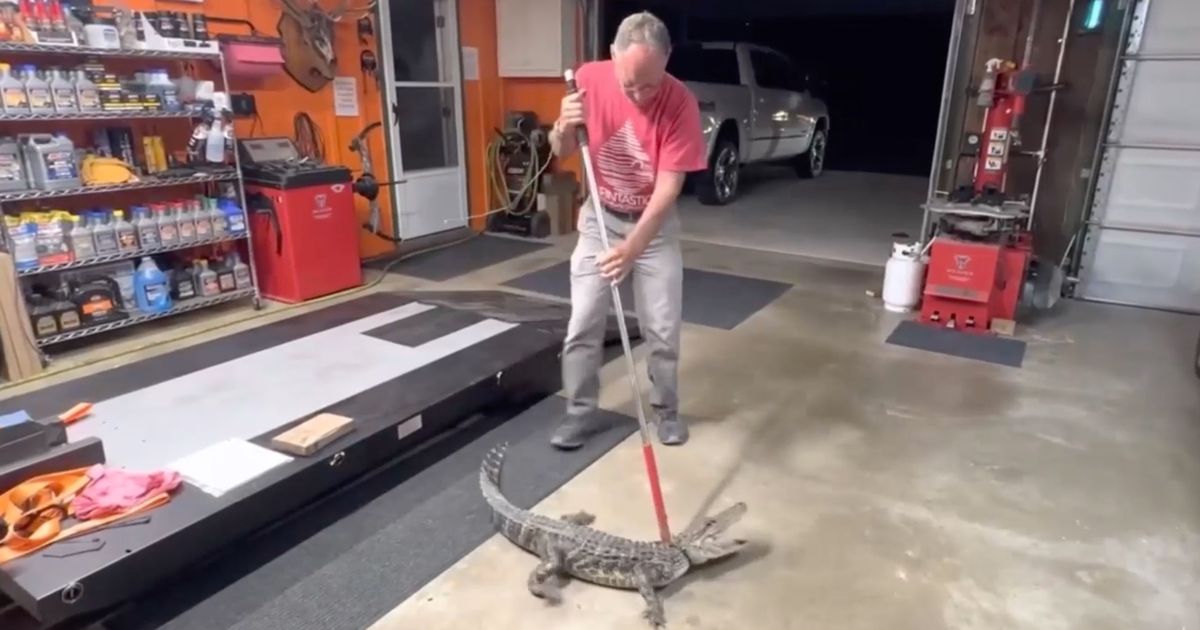Save articles for later
Add articles to your saved list and come back to them any time.
Carla Purcell is in luck: the number 96 tram is running on time.
The E-class drops her off punctually in Middle Park on this uncharacteristically sunny June day for her first interview since she took over as chief executive of Yarra Trams.
Yarra Trams chief executive Carla Purcell at Middle Park’s For Change Cafe.Credit: Joe Armao
Potential PR-gaffe averted. The 36-year-old needs things to keep going her way after returning from parental leave three months ago, straight into the top job running Melbourne’s iconic tram network.
It’s a big job at the best of times, with more than 475 trams, 250 kilometres of tracks, 2300 employees, 200 million passenger trips annually and no shortage of things that can and do go wrong.
“For some of these people, they’ve got no other means of travel and so that’s a pretty big responsibility,” Purcell says.
We meet a few days after a terrifying incident where police tasered a man armed with a knife on the number 48 tram in the CBD, after instructing the tram driver to keep him locked inside with other passengers.
Police Tasered a man on a Melbourne tram this month.Credit: Nine News
Purcell won’t comment on the incident while the man faces charges. But she says Yarra Trams is working with police and the transport department to improve safety, and perceptions of safety, potentially by deploying more protective services officers onto the tram network.
“There’s already PSOs and that’s something beneficial; obviously there’s a much greater presence, though, on trains,” she says.
I suggest to Purcell that she faces a particularly scorching baptism of fire. Yarra Trams has been suffering some of its worst punctuality performance results on record, and faces a looming risk that driver strikes will bring the network to a standstill again later this year.
All while she’s fighting to keep the keys to the network, as the Victorian government weighs up whether to renew Yarra Trams’ $500 million a year contract at the end of 2024 or hand it over to a different private operator.
The smashed avocado with grilled mushrooms at For Change Cafe in Middle Park.Credit: Joe Armao
“Yep, good summary,” she says with a laugh. “So why did I take the job, is that what you’re asking?”
It’s not a career she ever imagined growing up in Bentleigh, in Melbourne’s south-east. Purcell explains this over lunch at For Change Cafe, which sits in a former train station along the 96 line on the edge of Albert Park.
Attending Kilvington Girls Grammar School on an academic scholarship, Purcell dreamt of becoming an economist and went on to study commerce and law at Deakin University in Burwood.
Excelling in her law subjects at Deakin prompted a job offer from top-tier firm Ashurst that Purcell felt was too good to turn down. In 2013, she moved with her husband, a structural engineer, to Sydney to join Qantas’ hard-brawling industrial relations team.
The grilled field mushrooms on toast.Credit: Joe Armao
What should have been a short secondment to Qantas’ operations team sent her life in an unexpected direction. She relished the constant juggle of people and infrastructure that keeps planes landing and customers moving.
“Within three weeks I was, like, ‘This is me’,” she says. “Any given day, you’ll get hundreds of emails, hundreds of text messages, phone calls, and you need to figure out where to spend your time.
“You can make a lot of decisions that impact your employees and impact the customers.”
In 2018, Purcell was put in charge of Qantas’ flagship Sydney Airport international terminal, but after five years away, she felt the pull of her hometown.
So when Yarra Trams – owned by the French transport multinational Keolis and local ASX-listed infrastructure outfit Downer EDI – approached her about a position in charge of its workforce of 1200 drivers, the timing was perfect.
She was promoted to chief operations officer two years ago, overseeing the daily operation of the tram network, managing everything from timetables to customer experience and performance.
Purcell says she was reluctant to throw her hat into the ring when Keolis Downer management sounded her out for the chief executive role at Yarra Trams late last year, not least because she was preparing for the birth of her second child.
The bill at For Change Cafe.
“I had some reservations, to be frank, about whether it was right for me, whether it was the right time,” she says. “I was 34 weeks pregnant and I kind of went, ‘Alright, I’m open to the conversation’.”
Keolis Downer announced her appointment in November while Purcell was still on leave, and she returned to take on the new job in April.
Only 4.5 per cent of CEOs in the blokey world of Australian transport are women, compared with 20 per cent of CEOs across all industries, and Purcell says she didn’t get there by accident.
“People talk about diversity and inclusion and how you get more women into the workplace and in senior roles, but the reality is, they genuinely developed me for five years, giving me certain experiences and skills,” she says. “There had been deliberate decisions made along the way.”
Purcell has chosen the venue for our lunch and places her regular order here: two mountains of smashed avocado and feta, sprinkled with dukkah and salsa verde on multigrain with a side of grilled mushrooms.
I get the grilled field mushrooms on toast, which arrives with pickled shallots and watercress to cut through a rich base layer of macadamia cream and is topped with a crispy tuft of enoki.
‘We have to get people back on public transport if we want to achieve our sustainability and energy efficiency goals.’
For Change Cafe is a social enterprise that provides hospitality skills to young people experiencing or at risk of homelessness, and pays Yarra Trams a pittance to rent its quaint weatherboard building.
We talk about how the pandemic and the working-from-home revolution has changed how Melburnians get around: our roads have long since returned to pre-COVID levels of congestion, but tram patronage was still only at 75 per cent in May.
“We have to get people back on public transport if we want to achieve our sustainability and energy efficiency goals,” Purcell says.
Travelling by tram produces 92 per cent less carbon emissions than by car, she points out, with two solar farms in Victoria’s north now offsetting the network’s electricity use.
Carla Purcell has endured a baptism of fire in her role as Yarra Trams chief executive.Credit: Joe Armao
“So we’re going to have to make sure the service we provide is in line with what people want and gets them to where they want to go,” she says.
On that front, there’s plenty of work to do. So far this year, one in five trams have been late. In March, 25 per cent didn’t arrive on time, a figure well short of the on-time target of 82 per cent and the worst monthly performance since Yarra took over the network in 2009.
Purcell acknowledges it’s been “a pretty tough few months” for the company, but it has been affected by things outside its control, such as CBD protests and level-crossing removal works that cause heavy traffic congestion that holds up trams.
This highlights what she says is one of the network’s biggest challenges: 75 per cent of tram routes share the road with cars and traffic, a unique feature in Melbourne.
Tram patronage slumped during the pandemic and hasn’t returned to pre-COVID numbers.Credit: Daniel Pockett
As more cars have congested the city, the city’s trams have become some of the slowest in the world, with average travel speeds of about 16km/h.
Purcell says speeding up trams is essential to making them an attractive alternative to driving, and that will only become more important as inner-Melbourne suburbs become more densely populated along key routes. But that aim will have to come at the expense of cars.
“We’ve got to make some hard decisions around motorist versus tram user,” Purcell says.
A key step would be adjusting more traffic lights so they automatically turn green for approaching trams, she says, which is a method commonly used in many tram networks including Canberra and the Gold Coast.
“You have a tram carrying 200 people versus a motorist [car] with maybe one person – it’s a pretty compelling case,” Purcell says. “So there’s going to some pretty big calls like that down the track that could really shift the dial.”
Installing concrete dividers along some CBD routes recently to stop cars turning in front of trams has reduced collisions by 20 per cent and increased average speeds by a modest 3 per cent – the first gain in “many, many years”.
Yarra Trams advises the Department of Transport and Planning on how it can run the network better. But the government makes the big calls that Purcell has to live with, whether she likes them or not.
A case in point is when I ask what she thinks about the free tram zone. She exhales forcefully and composes herself.
“It’s great for tourists and great for Melbourne. Challenging from a tram-user perspective because they often have a lot of crowding in the CBD – it can make it a pretty undesirable experience. It definitely impacts performance,” she says. “But I understand the broader benefits.”
Another unpopular but necessary move to improve performance could be removing some tram stops, she says, as some are only 50 or 100 metres apart and barely give drivers time to increase speed.
Customers’ experience will improve, she says, when some of the oldest A- and Z-class trams are replaced with the new “Next Generation” or G-Class trams from 2025. The new trams will have more room and low floors for better accessibility.
Whether Purcell will see any of these ideas put in place hinges on the tender process under way for the next tram franchise contract. Yarra Trams’ current seven-year contract, worth $3.5 billion if it has met all its performance targets, expires at the end of next year, and it will be competing hard against two other shortlisted bidders.
One is a consortium of Transdev, which in 2022 was booted off its contract of running one-third of Melbourne’s bus services after a woeful punctuality performance, and construction giant John Holland, which owns 20 per cent of Metro Trains and is building the Metro Tunnel underground rail line.
Kinetic, the Melbourne-based group that operates SkyBus and took over Transdev’s city bus contract, is the third bidder with its Spanish transport partner Globalvia and the multinational infrastructure group Acciona.
Purcell, unsurprisingly, says Melbourne’s trams are best left in her hands.
“Having operated it for 13 years now, we know the network better than anyone, so we know what the opportunities are, we know what our customers want and how to grow patronage,” she says.
The Morning Edition newsletter is our guide to the day’s most important and interesting stories, analysis and insights. Sign up here.
Most Viewed in National
From our partners
Source: Read Full Article









